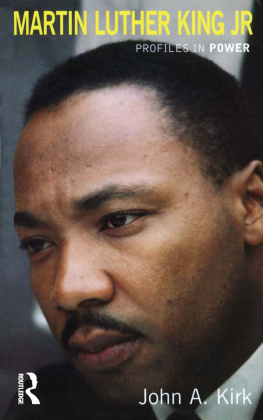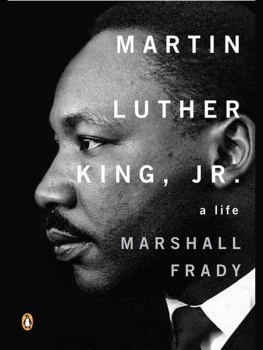From Civil Rights to Human Rights
POLITICS AND CULTURE IN MODERN AMERICA
Series Editors
Glenda Gilmore, Michael Kazin, Thomas J. Sugrue
Books in the series narrate and analyze political and social change in the broadest dimensions from 1865 to the present, including ideas about the ways people have sought and wielded power in the public sphere and the language and institutions of politics at all levelsnational, regional, and local. The series is motivated by a desire to reverse the fragmentation of modern U.S. history and to encourage synthetic perspectives on social movements and the state, on gender, race, and labor, on consumption, and on intellectual history and popular culture.
From Civil Rights to Human Rights
Martin Luther King, Jr., and the Struggle for Economic Justice
Thomas F. Jackson

Copyright2007 University of Pennsylvania Press
All rights reserved
Printed in the United States of America on acid-free paper
10 9 8 7 6 5 4 3 2
Published by
University of Pennsylvania Press
Philadelphia, Pennsylvania 19104-4112
Library of Congress Cataloging-in-Publication Data
Jackson, Thomas F.
From civil rights to human rights : Martin Luther King, Jr., and
the struggle for economic justice I Thomas F. Jackson.
p. cm. (Politics and culture in modern America)
Includes bibliographical references (p. ) and index.
ISBN 13: 978-0-8122-2089-6
1. King, Martin Luther, Jr., 1929-1968. 2. Human rightsUnited
States. 3. African AmericansCivil rights.
E185.97.K5 J34 2007
2006050930
In memory of my mother, Dorothy R. Jackson, and a dedicated mentor, Michael F. Foley
The essence of being human is that one does not seek perfection, that one is sometimes willing to commit sins for the sake of loyalty and that one is prepared in the end to be defeated and broken up by life, which is the inevitable price of fastening ones love upon other human individuals.
George Orwell
I wont have any money to leave behind. I wont have the fine and luxurious things of life to leave behind. But I just want to leave a committed life behind.
Martin Luther King, Jr.
Contents
Introduction
Over the course of his public ministry, between the Montgomery bus boycott of 1956 and the Memphis sanitation workers strike of 1968, Martin Luther King, Jr., wove together African American dreams of freedom with global dreams of political and economic equality. King opposed racism, imperialism, poverty, and political disfranchisement in increasingly radical terms. Often he referred to the American civil rights movement as simply one expression of an international human rights revolution that demanded economic rights to work, income, housing, and security. For most Americans, however, Kings freedom dreams have become a sound bite recorded in August 1963 on the steps of the Lincoln Memorial, when he envisioned a world where all men sit down together at the table of brotherhood and children are judged not by the color of their skin, but by the content of their character. King overshadows the mass movement that made him famous, his sharp, dissident critique compressed into simple messages of nonviolence and American democracy celebrated as an accomplished fact rather than thwarted as a deferred dream.
Few Americans recall the discordant notes with which King began his legendary speech at the March on Washington for Jobs and Freedom. One hundred years after Lincolns Emancipation Proclamation, Negroes still wore shackles of segregation, discrimination, and impoverishment. They existed on a lonely island of poverty, banished to the corners of American society. The nations founders had issued a promissory note guaranteeing life, liberty, and the pursuit of happiness to all Americans. But the check bounced when black Americans tried to collect. We refuse to believe that the bank of justice is bankrupt. We refuse to believe that there are insufficient funds in the great vaults of opportunity of this nation, Kings voice boomed from his electronic pulpit. Negroes were demanding the riches of freedom and the security of justice. The March on Washington pushed to the foreground economic needs and demands that reflected the movements broadening social base and ongoing northern struggles for jobs and justice. Dreams of economic justice had long been central to the black freedom struggle and to Kings social gospel vision. Though activists could speak of winning civil, political, and economic rights in sequence, many also considered these human rights as mutually reinforcing and international in scope.
Dreams of decent jobs, affordable integrated housing, and adequate family incomes remained central to Kings public ministry until his death.
As the first half of this book makes clear, Kings vision of economic freedom was rooted in his intellectual development and early experiences in the southern black freedom movement. Since the 1956 Montgomery bus boycott, King had repeatedly urged blacks to dream of a world free of racism, militarism, and materialism. For King, materialism encompassed the irrational inequalities of wealth under the American system, the tragic exploitation of a racially divided working class, and the morally corrosive and socially isolating obsession with individual success. As early as 1956, King publicly described his dream of a world in which privilege and property [are] widely distributed, a world in which men will no longer take necessities from the masses to give luxuries to the classes, a world in which men will throw down the sword and learn to love and serve others.
Movement veterans never forgot Kings radicalism. In the accurate, sardonic words of Vincent Harding, Kings legacy has been compressed into safe categories of civil rights leader, great orator, harmless dreamer of black and white children on the hillside. Documenting Kings radicalism but overstating the degree to which the events of the 1960s radicalized him, David Garrow argued in his seminal books that King transformed himself from a reassuring reformer into a radical threat to Americas class system and dominant institutions. By November 1966, King concluded that the movements most stubborn obstacles were economic rather than legal, and tied much more closely to questions of class than to issues of race, Garrow argues. It is true that in 1968, King affirmed publicly what he had denied ten years earlier: that blacks were engaged in a class struggle. But since the 1940s, King consistently had understood race and class as mutually reinforcing structures of unequal
Even in the 1950s, King was never simply a civil rights leader unconcerned with the national political economy. Many authors echo Adam Faircloughs notion that King was a non-ideological pragmatist before he was radicalized in 1965, that he regarded racism as a southern problem and was only vaguely concerned with capitalism. Like his father, King advocated thrift, hard work, economic individualism, and self-help, Fairclough argues.
Kings opposition to racism, war, and poverty did grow more overtly radical in the 1960s as the nation became polarized over these issues. He advocated increasingly militant protest tactics, from boycotting and marching to civil disobedience and mass urban disruption. He hoped the national government would move from guaranteeing legal protections for civil and voting rights to spending billions of dollars for full employment, income guarantees, and massive reconstruction of urban communities. Yet King was already radical by 1964, even as he tailored his messages to liberal or moderate audiences.
Next page






